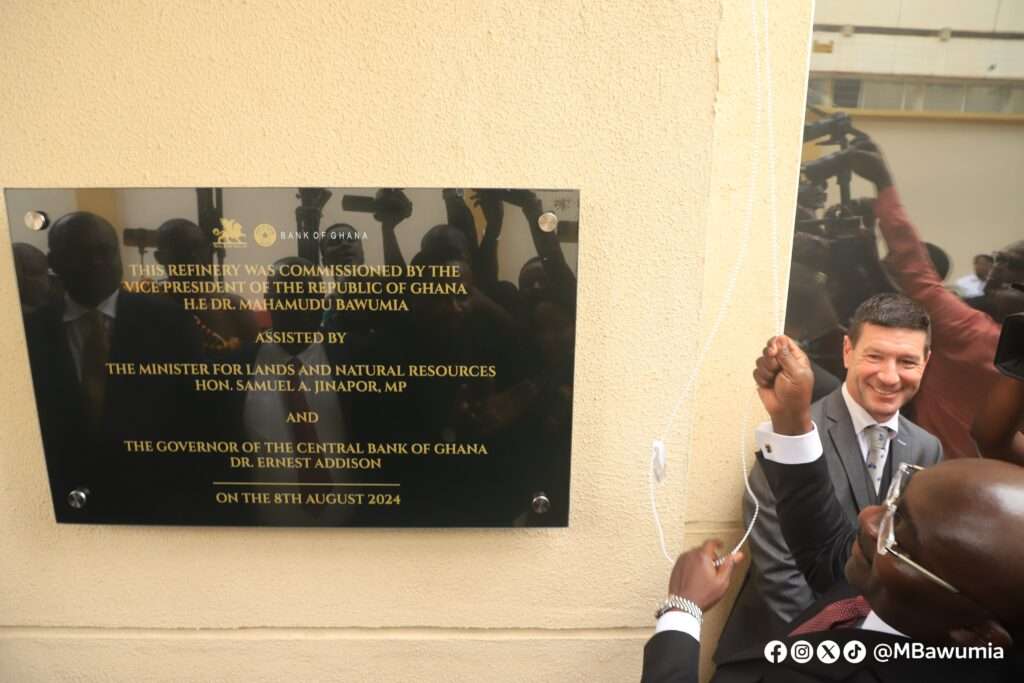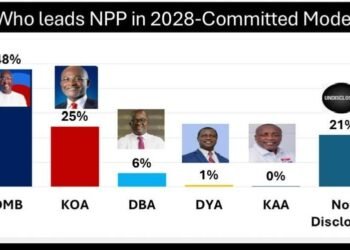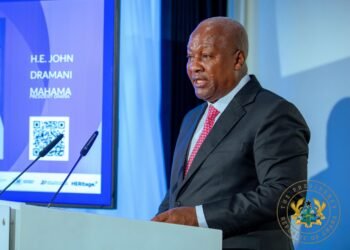Bright Simons, the Honorary Vice President of IMANI-Africa, has expressed surprise over the announcement of Ghana’s “first commercial gold refinery,” highlighting concerns about the feasibility and sustainability of such ventures.
In his commentary, Bright Simons highlighted that this is not the first time Ghana has seen the opening of a gold refinery, with similar promises of value addition, job creation, and strengthening of the Cedi.
Bright Simons noted that similar rhetoric accompanied the launch of other refineries, including Asap Vasa Company Limited in 2013, Sahara Royal Gold Refinery in 2015, and Gold Coast Refinery in 2016. Despite these efforts, Bright Simons questioned why the country is still grappling with issues related to value addition in its gold sector.
“Gold refining is a brutally unprofitable business if all you are doing is refining mined gold (dore or smelted gold) into bullion gold, which is what all the refineries launched in Ghana are doing.”
Bright Simons, the Honorary Vice President of IMANI-Africa
Bright Simons pointed out that one of the world’s largest refineries, located in Perth, Australia, operates on a razor-thin margin of 0.17%, highlighting the inherent financial challenges in the gold refining industry.
Bright Simons’ concerns are grounded in the history of Ghana’s gold refinery sector. The initial excitement surrounding these ventures often fades as the practical challenges of the industry become apparent.
Refining gold, Bright Simons argued, is an extremely high-volume business, necessitating massive production to achieve profitability. Yet, Ghana’s local refineries have struggled to secure a steady supply of gold due to several factors.
Large-scale miners in Ghana typically have long-standing agreements with established international refineries, making it difficult for new local players to break into the market.
As a result, Ghanaian refineries have had to rely on small-scale miners for their supply, which not only reduces the volume of gold available but also affects the quality. The lower-quality dore gold often requires further smelting, adding to the costs and reducing profit margins.
Bright Simons highlighted that the environmental and financial challenges of operating a gold refinery in Ghana are exemplified by the struggles of the Sahara Royal Gold Refinery. The company faced opposition from local residents due to environmental concerns and experienced significant cash flow problems, leading to the issuance of dud cheques by its principals.
“Without certification from LBMA, one has to sell at a discount to less rigorous buyers. Such certification takes time and can be expensive to maintain. The insurance & security dynamics all eat at the margins.”
Bright Simons, the Honorary Vice President of IMANI-Africa
The process of obtaining and maintaining LBMA certification is both time-consuming and costly, further eroding the already thin margins in the industry. Moreover, the costs of insurance and security also eat into the profitability of these ventures, making it challenging for local refineries to compete on the global stage.
Bright Simons also highlighted the reluctance of small-scale miners to sell their gold at a significant discount to local refineries when they can fetch higher prices from international buyers, particularly in India and Dubai.
Tax incentives in these countries make the import of raw gold for refining more lucrative, adding yet another layer of complexity to Ghana’s gold refining industry.
Real Path to Value Addition

In his critique, Bright Simons suggested that policymakers should focus less on public relations and more on addressing the structural issues that hinder the success of gold refineries in Ghana.
Bright Simons argued that the real value addition in the gold sector lies in the production of jewelry rather than merely refining gold into 24-carat bars.
“That is what PMMC [Precious Minerals Marketing Company] was set up in Ghana to do. Policy should be focused on getting it to succeed,” Simons emphasized.
The recent inauguration of the Royal Ghana Gold Limited touted as Ghana’s first large-scale gold refinery, has reignited a longstanding debate on the efficacy of gold refineries in the country.
While the launch, officiated by Vice President Dr. Mahamudu Bawumia, has been hailed as a historic achievement for Ghana’s natural resources sector, critics, including Bright Simons, Honorary Vice President of IMANI-Africa, have expressed skepticism over the project’s potential to deliver on its promises.
Despite the criticisms, Vice President Bawumia remains optimistic about the prospects of the Royal Ghana Gold Limited refinery. During the commissioning ceremony, he stressed that the state-of-the-art facility, established through a partnership between the Government of Ghana, the Bank of Ghana, and Rosy Royal Minerals Limited, has the capacity to refine gold to 24 carats with 99.99% purity, meeting LBMA standards.
“With the ability to locally refine our gold, Ghana will be able to sell the refined gold at its appropriate price, enabling us to retain its economic value within our borders, while creating numerous job opportunities for the youth.”
Vice President Dr. Mahamudu Bawumia
The launch of Royal Ghana Gold Limited marks a significant moment in Ghana’s natural resources sector. However, as Bright Simons cautions, the path forward requires a strategic focus on addressing the underlying challenges of the gold refining industry.
This includes prioritizing governance over public relations, tackling the high costs associated with certification, and redirecting attention towards sectors like jewelry that offer genuine potential for value addition. Only then can Ghana hope to realize the true economic potential of its gold reserves.
READ ALSO: ISSER Urges Govt to Support SMEs with Proven Track Record























